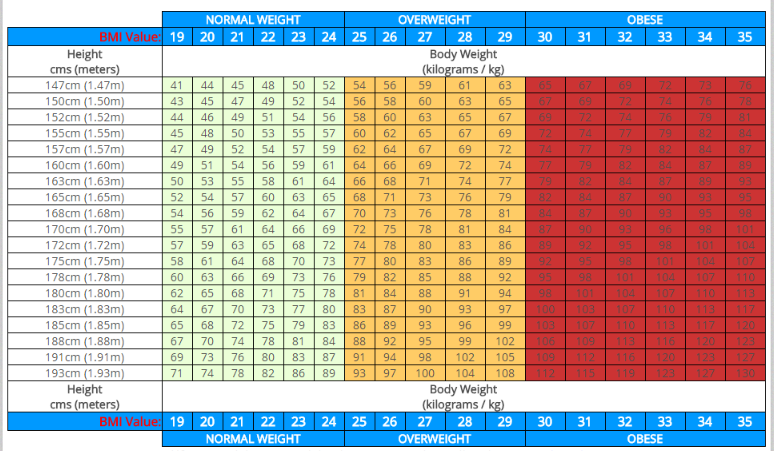Nowadays, many struggle with excess weight and obesity. Not only is it an aesthetic category, it is much more important that obesity is a significant risk factor for the development of a number of diseases.
Namely, obesity significantly increases the risk of developing high blood pressure, cardiovascular diseases, cancer, type 2 diabetes and a number of chronic diseases.
Body weight calculators were designed with the aim of being able to monitor your body weight and the framework within which a person is of normal weight, overweight or obese. Using calculators, the "ideal weight" of an individual person is calculated by calculating the ratios of height and body weight. Of course, as mentioned, this is only a guideline for averagely active and inactive individuals, while it cannot be applied to, for example, professional athletes.
Body mass index
BMI is calculated according to a simple formula: weight in kilograms is divided by height in meters squared:
BMI = weight (kg) / height2 (m2)
BMI is one of the data that doctors and nutritionists are guided by when assessing the risk of developing chronic diseases.
|
Category |
BMI – kg / m2 |
|
Serious emaciation |
< 16 |
|
Moderate thinness |
16 – 17 |
|
Mild emaciation |
17 – 18,5 |
|
Normal body weight |
18,5 – 25 |
|
Excessive body weight |
25 – 30 |
|
Obesity, class I |
30 -35 |
|
Obesity, class II |
35 - 40 |
|
Obesity, class III |
> 40 |
Therefore, in order to achieve an ideal weight, i.e. one that will protect your health and protect you from the development of chronic and other diseases, it is necessary to acquire lifestyle habits that will help you achieve or maintain weight, as well as a good general state of the body.
According to the recommendations of scientists from the American Institute of Health, BMI should be used in combination with other personal data, such as physical activity, origin, gender, risk of hereditary diseases, alcohol and tobacco consumption and a number of other characteristics to determine the ideal body weight.
However, scientists from the aforementioned institute have created guidelines based on a series of studies conducted on people of different BMI with the aim of achieving or maintaining an ideal weight which, consequently, will have the best effects on health.

After you have calculated your BMI in the table above, check which category you fall into according to the results obtained.
Note: People with increased muscle mass, such as professional athletes or bodybuilders, will most often be obese according to the classic BMI calculation, but in their case these formulas do not apply, but fat levels and ratios are measured with other devices, such as calipers, hydrostatic measurement or bioelectrical impedance.
If your BMI indicates overweight or obesity and, in addition, you have 2 or more health risk factors, such as smoking, insufficient physical activity, elevated blood pressure or cholesterol, or a family history of cardiovascular disease, it is definitely recommended that you start the program losing extra pounds.
A person who takes less than 4,000 steps per day, measured with a pedometer, averaged over a period of one week, is considered an insufficiently physically active person.
Waist circumference
Also, one of the indicators of obesity is waist circumference, which many point out as a more important risk indicator for the development of the disease than BMI itself. See the results in the table below:
| Increased health risk | Significant health risk | |
| Men | > 94cm | > 102 cm |
| Women | > 80 cm | > 88 cm |
Namely, the existence of abdominal fat is directly related to the risk of disease. Namely, fatty tissues produce hormones and pro-inflammatory chemicals that affect metabolism, the immune system, inflammatory processes, the progression of artery clogging and the development of cancerous tissues. Therefore, it is clear that a lack of fatty tissue preserves health and reduces the risk of the aforementioned disorders and diseases.
How to reach the ideal weight?
In order to achieve an ideal weight, it is necessary to make an energy balance: the amount of energy that we enter into the body through food and drink must be in balance with the amount of energy that the body uses for the activities it performs during the day.
If the energy input is equal to the energy expended, the body weight will remain the same. In case of increased energy intake from consumption, the person will gain weight. In the opposite case, if more energy is spent than is taken in, the person will lose kilograms.
However, regardless of whether you want to maintain your weight, gain or lose a few kilograms, there are health guidelines that should be followed.
FOOD

Try to acquire healthy eating habits and gradually remove from your diet everything that can hinder you on the way to the ideal weight or its maintenance. If you are overweight and want to lose extra pounds, limit your caloric intake to 500 kcal less than your daily consumption. In this way, you will lose extra pounds completely, without endangering your health, and you will not risk their return after you increase your caloric intake to equal your consumption.
Under healthy eating habits, primarily try to stay away from what is called "white death" in medical jargon: salt, sugar and white flour. Namely, these three foods are directly connected, it has been scientifically confirmed, with an increased risk of contracting a number of diseases. Along with them, it is advised to exclude ready-made food, processed foods, carbonated drinks and foods containing trans fats from the diet. Therefore, read the declarations when choosing the foods you buy, with a conscious approach to food, you will make it easier for you to reach your desired weight and improve your general health.
When choosing food, give priority to fresh fruits and vegetables, meat of controlled origin, fresh fish, nuts, eggs from domestic farming, whole grains, etc. Find a shopping list here: quality food for the best results!
Eat meals regularly and in smaller quantities. Try to eat every 2.5-3 hours. It is best to plan 3 main meals (breakfast, lunch and dinner) and 2 snacks. When choosing macronutrients, make sure that you reduce the intake of carbohydrates as the day goes on, and that in each meal, in addition to the source of protein, you choose whether you will have a source of fat or a source of carbohydrates, and not both.
Physical activity

Physical activity is extremely important in achieving the desired body weight. Experts advise regular physical activity at a moderate pace. If you are a beginner, try to start with 30 minutes of moderate walking, 5 times a week, and then, slowly and in accordance with your own effort, include other types of activities such as cycling, rollerblading or some other type of training, according to your own interest (fitness, gym, swimming , functional training, group trainings, etc.).
In training, just like in nutrition, it is important to capture the continuity of exercise. Be regular in training and try not to skip the training schedule. Only with the continuity of training, you will achieve the acceleration of metabolism, which is essential for melting fat tissue, but also faster metabolism, better digestion and, in general, better health.
If you think you don't have time to exercise, do a little test: in the next 3 days, write down exactly how much time you spent in front of the TV, on social networks and, in general, on the Internet. We guarantee that the result will be more than 30 minutes. How about trading that time for training?
Dream

Sleep and rest is an equally valuable segment of health, just like healthy nutrition and regular physical activity. Namely, during rest, the body recovers from the day's activities, and the muscles regenerate and prepare for the efforts that await them the next day.
Try to go to bed at approximately the same time every night and sleep for at least 7 hours. Before going to bed, avoid alcohol and tobacco because they disrupt sleep and its quality. Sleep in a quiet and darkened room, and before going to sleep prepare a bath or read your favorite book with soft music.
Decision to change habits
However, in addition to the above general guidelines for maintaining or reaching an ideal weight, experts emphasize mental readiness to change habits as an extremely important factor. Namely, it is precisely the "decision" that can lead to change, or prevent it.
Goal setting
Namely, each goal must be specific, feasible and imperfect, so that a person has real motivation and the ability to monitor progress. Perfect are those goals that are achievable only under perfect conditions, which is almost never the case.
For example, a realistic goal sounds like this: "I want to lose 10 kilograms in 6 months, with a proper diet and exercising 3 times a week in the gym!"
With such a goal, the method of achieving the goal, the period in which it is expected to be achieved, and the exact result are clear.
Given the often long-term goals, it is good to set a series of smaller goals that will motivate you on the way to their realization. "For the next 7 days, I will not eat anything sweet", is one example of goals that lead to the realization of the main goal, and after realization give moral satisfaction and confirmation of perseverance.
Additionally, come up with rewards for achieving smaller goals, but not in the form of junk food. Psychologists confirm that smaller rewards are much more effective than large ones, the realization of which requires a longer time and greater effort, either physically or mentally. Reward yourself with something you particularly like, like going to a concert or similar.
Keep a journal
A nutrition and training diary is an extremely important activity that helps in monitoring results, controlling progress, but also implementing changes if at some point progress is absent or slows down. Today's smartphone users have access to a number of applications related to nutrition or training that help them monitor, control results, and also motivate.
Therefore, with the acquisition of healthy lifestyle habits, from food to regular physical activity and quality rest, achieving an ideal weight becomes only a logical consequence that will contribute to better health, but also to an overall better general condition of the organism.
